|
Archive: June 2003
(click for fullsize view)
 |
Wow - this is sooo cool. I found this site in my referer logs - a Taiwanese message board linking my Google and Blogs article. (Note red circles - a hover over the link. Anyone know what the link says? "Click here"?)
Acidman throws in the towel! Apparently because of confusion over his convoluted ritual de-linking of blogrollers. Too bad, if true; I did enjoy his blogging, even if he occasionally crossed every line. Rob Smith is one of those people who put themselves out there, who truly talk about what they feel. In his case I think it was therapeutic, he's going through a tough time adjusting to being divorced. I hope he knows he can come back any time he wants, or needs to.
It is tough to avoid the "more hits make me a better person" cycle. The cool thing about web sites is that you can log everything (like the link from the Taiwanese site above). The bogus thing is you can count everything, so you have a running scoreboard of your "success". I know I only have six visitors - you're one of them, so thank you - and therefore I don't worry about this too much :)
Jon Udell just gave a keynote speech at OSCOM (Open Source COntent Management Conference). His first slide:
Some lessons you learned in grade school:
- Write effective titles and topic sentences
- Neatness counts
- Share with others
- No hitting
This sounds like great advice for a blogger! Of course, "no hitting" doesn't mean "no linking"... :)
Here's a terrific chart which shows the evolutionary history of all computer languages, from Fortran in 1954 to C++, Java, Perl, Python, etc. The "health" of each language is color-coded: Green = active, Orange = available, Red = endangered, and Black = extinct. On the chart are listed seven reasons a language endures (with example):
(click for fullsize view)
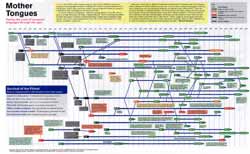 |
- Appeals to a wide audience - C
- Gets a job done - Cobol
- Delivers new functionality - Java
- Fills a niche - Mathematica
- Offers a modicum of elegance - Icon
- Has a powerful user base or backer - C#
- Has a charismatic leader - Perl
This brings to mind Paul Graham's musings on the hundred-year language. Interesting to speculate whether today's prominent language (C++, Java) will persist, or whether an entirely new language will emerge...
|
|
Three spacecraft launch toward Mars this month. Excellent!
The media are constantly casting missions to Mars as "trying to discover life". It would be cool if there is or was "life" on Mars - very exciting scientifically, and very unlikely, by the way - but there is so much more to learn. Someday the Earth's resources will be exhausted, and if humans are still around we're going to have to colonize space. Mars is the first best place to figure out what that will take.
Personally I think this type of mission is extremely important, much more so than any of the space shuttle missions. (I suppose we did learn a lot from the space station.) The knowledge / cost ratio of unmanned probes is several orders of magnitude higher than manned missions.
CNet: Computers replace petri dishes in biological labs. Also microscopes :)
 NewScientist: Gecko tape will stick you to the ceiling. It is really cool the way Geckos can climb glass. What a terrific adaptation. NewScientist: Gecko tape will stick you to the ceiling. It is really cool the way Geckos can climb glass. What a terrific adaptation.
The always interesting Bruce Tognazzini gives a Quiz on Fitt's Law. Anyone interested in user interface design should check this out. (Actually anyone interested in UI design should bookmark AskTOG!) Oh, by the way, "Fitts's Law: The time to acquire a target is a function of the distance to and size of the target."
|
|
World Health Organization: SARS: status of the outbreak and lessons for the immediate future [PDF, via SARS Watch]. Lots of great info. Currently 8,221 people have been infected by SARS and 735 have died. Related: Salon reports that Hepatitis C has become a major problem in third-world countries.
 Apple's design guru Jonathan Ivie has been named "Designer of the Year" by the London Design Museum. Cool. Apple's design guru Jonathan Ivie has been named "Designer of the Year" by the London Design Museum. Cool.
Wow. John Dvorak has started a blog - sort of. He's guest blogger on Boing Boing this week, which means he'll be doing a "mini-blog" down the right side. All the more reason to visit Boing Boing... John has historically been anti-blog, but he often takes an early "anti" position on anything to be controversial, then embraces it later once it becomes mainstream.
Joel Spolsky thinks the browser wars are restarting: "Where it gets interesting, is, approximately, today, because, for the first time, the Mozilla Firebird browser has finally caught up with Internet Explorer." But Andrew Leonard disagrees: "And so, the browser wars end, again, not with a bang, but with a plea bargain." Who's right? Well, in some ways they both are. Mozilla and its offspring are going to continue to improve and multiply, and provide a better experience for experienced users. IE is going to remain "the standard" (looks like AOL will continue to use it as well) for newbies. And bloggers will continue to have something to write about :)
AMD's Opteron's are now available, and workstations using them are starting to appear. Let's see, faster and cheaper than a 32-bit Xeon, faster and way cheaper than a 64-bit Itanium (for 32-bit applications). Seems like this would find a market, eh?
|
|
Bigwig considers whether Scott Peterson should be tried for the murder of his unborn child. This gets back to the ongoing debate about when a fetus becomes a person. At conception? At birth? Or somewhere in between...
Want to surf the web from your wrist? Check out SPOT, Microsoft's new technology to enable small personal and household electronics to receive and display information from the Internet. Now you can check my blog anywhere you happen to be :)
Toshiba announced a Media Center laptop, wow. This means you can watch TV, and even "Tivo" TV, from your laptop... Meanwhile Sony has announced a whole bunch of new desktops with multimedia capabilities. Looks like Dell and HP don't have the market to themselves, yet.
Are you in the matrix? Nick Bostrom proves that it is far more likely you are a simulation than that you are real. Fascinating! "Given that humans don't go extinct in geologically short time, eventually computer capability will allow complete simulation of the human cortex. Consequently, there must be far more simulations running in future millennia than seconds since you were born. Thus its astronomically more likely you are a simulation than real..." [ via Slashdot ]
Joel Spolsky: Fixing Venture Capital. "There are certain fundamental assumptions about doing business in the VC world that make venture capital a bad fit with entrepreneurship." This is a great overview of what's wrong in the VC world, but the title is a little misleading, because Joel doesn't really suggest any changes. Except maybe a generic "pick better companies to invest in".
I actually think VC strategies are 100% Darwinian. There will be mutations in the strategies, and the successful mutations will reproduce, and eventually take over. If the current strategy is to try to hit home runs once every ten swings, but trying to hit singles every time works better, the industry will evolve in that direction. The key issue is that VC strategies are measured by VC success, not entrepreneur success. (Joel makes this point, too.) Viewed in this way, maybe VC does not need fixing. It is what it is.
Joel links an SFGate story about WebVan, which brings back a whole host of memories for me. I lived in Los Altos, California at the time, and we loved WebVan. It was one of the greatest consumer services ever. On the other hand, they lost $830M. It was one of the crummiest businesses ever. As WebVan was dying I remember saying "I would pay more to keep them afloat". I don't know if their model would ever have worked - they seem to have pissed away a lot of the $830M on perks, rather than burning it in operations - but there sure was a kernel of goodness to what they were doing. They just wanted to get too big, too fast, urged on by Benchmark and their other VCs. And this is Joel's point.
Andrew Anker considers contextual advertising: "Consumers have one of two modes when they visit websites: browse or search... contextual advertising is extremely effective when a user is in search mode but a needless distraction in browse mode." I think he nails it. How would you feel if I hosted ads on this blog, eh?
I just got a tee shirt that says "I'm blogging this". Shirley said, "I'm going to put that on your tombstone". Now that would be cool.
|
|
  This headline this morning really caught my eye: Palm to acquire rival Handspring. Wow. This headline this morning really caught my eye: Palm to acquire rival Handspring. Wow.
I love my Treo, and I've been a big fan of Handspring ever since the first Visor. Overall maybe this is a "good thing"; it will strengthen both companies in the market war against Microsoft's Pocket PC.
Handspring was founded by Jeff Hawkins and Donna Dubinsky, the same people who founded Palm. The release says they'll stay with the combined company, but one would guess they'll do that only through a transition period, and then leave. (Probably to start yet another company!)
  I can remember when Handspring was founded it seemed like they took all the initiative from Palm with them; Handspring was releasing cool new products while Palm stagnated. But the Visor's Springboard slot for add-on devices never really took off - not enough companies made modules - and more recently Handspring has focused on the Treo, which was the first truly decent combination of a phone and a PDA, but despite its technical success it has not been a commercial one. I can remember when Handspring was founded it seemed like they took all the initiative from Palm with them; Handspring was releasing cool new products while Palm stagnated. But the Visor's Springboard slot for add-on devices never really took off - not enough companies made modules - and more recently Handspring has focused on the Treo, which was the first truly decent combination of a phone and a PDA, but despite its technical success it has not been a commercial one.
Palm has been busy lately - they spun off the Palm OS business into a separate company called PalmSource, and released some cool new products like the Tungsten and the Zire. This combination should strengthen both companies. It will be fun to watch!
|
|
The U.S. joins the SARS victim community: Nine cases reported in North Carolina.
Oracle has launched a hostile takeover bid for Peoplesoft. Interesting. "This is a consolidating industry," said Ellison. "Only the strong get stronger." I'm a little confused about what industry is consolidating... business software? Software in general? This seems like a preemptive strike to take out a competitor, nothing more. Very little value gets created in this type of deal.
Takeovers to take out a competitor are like patent fights. Lots of value sucked off by the lawyers, nothing new created, nobody benefits. Pure defense.
When I was at Digital Insight, early on we had a chance to buy a smaller competitor. Some in our team thought it was a great idea, good synergy, etc. Paul Fiore, our CEO, thought it was a terrible idea. Paraphrasing: "The only real synergy is the customers. Instead of buying all those customers, let's just take them in the market one-by-one." And we did. Pure offense.
3Leaf posts a great list of attributes desired in a new hire. I like #2: "You are not arrogant. If you're not arrogant, but everyone else seems to think you're arrogant, then for the purposes of this discussion, you're arrogant." I guess I don't qualify :)
Ned Batchelder: Business Card Cubes. I like it!
The 37th Carnival of the Vanities is up (but who's counting). They're getting longer - lots of blogsurfing to do. They should have an RSS feed. Oh, but there is no they. Yet. There could be a they. Hmm...
My pick from this litter is Daniel, etc. (I put him on my extended blogroll.) After reading I really like Daniel. Isn't it so much more attractive when people don't try hard to be attractive?
Have you ever wondered if SCSI is really better than IDE? If so, then this article is for you. The punch line: yes, SCSI is faster, especially for a Windows boot drive. Interesting...
Boing Boing notes: "It costs NASA less to send a probe to Mars than it would cost Hollywood to make a movie about it."
  Greg Costikyan was"inspired" by the fact that actor Hugo Weaving plays both Elrond and Agent Smith: Greg Costikyan was"inspired" by the fact that actor Hugo Weaving plays both Elrond and Agent Smith:
"You seem to live two lives, Mr. Baggins. In one, you are a peaceful and productive resident of the Shire. In the other, you flit about the world in the company of wizards, dwarves, and other low lives, apparently attempting to hurl a magic ring into a volcano."
"One of these paths has a future, Mr. Baggins."
[ Later: I was thinking about this. The Matrix is designed to fool humans being used as batteries into thinking they're living "normal" lives so they function normally. But what's "normal"? Couldn't there be more than one matrix? Perhaps Middle Earth is a matrix. Perhaps the elves are really agents. Perhaps Elrond is Agent Smith. (Perhaps I have stretched this too far...) ]
|
|
QOTD from Phil Wolff: "RSS newsreaders are Tivo for bloggers". [via Doc Searls ] This is cute but wrong. Tivo does three main things:
- It timeshifts television content. You can watch what you want when you want.
- It allows you to fast-forward through commercials.
- It finds things it knows you will like based on experience.
So RSS newsreaders do none of these things. Blogs don't need timeshifting, because Internet content can always be accessed when you want. It doesn't do anything like skipping commercials. It doesn't find anything you didn't explicitly tell it to aggregate. Newsreaders also change the program by displaying an abstracted version, unlike Tivo which displays the original content "as is". So the analogy is useless.
However, I have come around to using an RSS aggregator, I use SharpReader all the time. It helps me discover when blogs I like have new content; it is faster than blogsurfing. SharpReader is my favorite because blog contents look almost like they do in a web browser (they are actually displayed by the IE ActiveX control).
Just signed Lawrence Lessig's petition: Reclaim the Public Domain. Please read it and if you agree with it, sign it. This is really important, in the last fifty years the concept of intellectual property ownership has gotten completely out of control.
"We, the undersigned, while believing in the importance of copyright, also believe in the importance of the public domain. We believe the public domain is crucial to the spread of knowledge and culture, and crucial in assuring access to our past. We therefore write to petition you to reconsider major changes that you have made to the copyright system. These changes unnecessarily threaten the public domain without any corresponding benefit to copyright holders."
FuturePundit: Altruistic Punishment and Genetic Engineering of the Mind. Wow. Unintentionally makes a strong case for doing something about Unnatural Selection.
Here's an interesting report on an Apple meeting with independent labels. Some iTunes Music store statistics: 6-6M copies of iTunes have been downloaded. The store sells 500K songs per month, and 45% are purchased as albums. 75% of the 200K songs have been sold at least once. 90% of sales are one-click downloads. There are 10 previews for every buy.
For indy labels, there is no cost to list music on iTunes, and no advance payments. "We're going to give so you the same deal as the big five [labels] - take it or leave it. This is a reseller agreement, Apple buys at the wholesale price, and sells retail. No complicated licenses."
Pearl Jam is leaving Epic, their label, after 12 years. "But this is more than just another band leaving just another label... because the band may no long require the services of a major label." Wow, they're going to sell music directly from their website, only. I wonder if they'll make a deal directly with the iTunes Music Store?
In related news, Wired notes iTunes music swap just won't die.
Andrew Anker says Don't Take the Money. An interesting post in response to Joel's Fixing Venture Capital article.
Ronald Piquepaille spends a night in a room from the future. Only it isn't the future, of course, it is the sometime present.
Dave Winer: New York Times archive and weblogs. Progress getting the NYT to keep their archives available for linking. But I don't get it yet - are only Dave's links going to stay valid? Will mine? Stay tuned.
Wired: Phoning over WiFi getting easier. This is going to be very interesting... Already my phone (a Treo) is basically a computer on a digital network. But it is a closed network belonging to Spring. What if it could join the open network belonging to nobody?
WiFi Speed Spray. I am not making this up. But they are :)
|
|
 The Maine Solar System Model is coming along nicely. At scale 1:93,000,000 the distance from the Sun (50ft. diameter) to Pluto (1" diameter) is 40 miles. Looking at the pictures, it really gives you a sense of how far apart the planets are compared to their size. Very cool. At this scale the Earth is the size of a softball, and is 1 mile from the Sun. The Maine Solar System Model is coming along nicely. At scale 1:93,000,000 the distance from the Sun (50ft. diameter) to Pluto (1" diameter) is 40 miles. Looking at the pictures, it really gives you a sense of how far apart the planets are compared to their size. Very cool. At this scale the Earth is the size of a softball, and is 1 mile from the Sun.
|
(click for fullsize screen)
 |
I hate when that happens, dept.: This is what you get at www.blogger.com: an ODBC error. This is the leading blogging tool, they were bought by Google [in part] to give themselves better infrastructure, and this is what happens! Man.
Two things about this. First, a site this critical should be monitored, and someone's beeper somewhere should go off whenever there's a problem. Basic. Second, if the database goes down something a little more user-friendly should be displayed, besides the raw error from the database. Something along the lines of "we are temporarily unavailable, we'll be right back". Also basic.
[ Update: They were down like this for two hours. I know getting a database back up can be ugly - I've been there - but surely they could have posted something smoother on their home page while they were getting it back up? ]
|
|
I'm reading Masters of Doom, about John Carmack and John Romero, the programming geniuses behind id software (Doom, Quake, etc.). Really fun reading. If you're a coder and especially if you're a gamer, you'll really enjoy it.
Commander Keen 1
(click for fullsize screen)
 |
I am not a gamer - at all - I have truly never played Doom or Quake, despite being in teams where we setup a separate network for high-performance multiplayer Doom. But I had to try Commander Keen, id's first game. Keen was released as DOS shareware in 1990, and was designed to emulate Nintendo-like graphics on the PC. Sure enough I found Commander Keen, all seven episodes, and then Dosbox which lets you run old DOS games under Windows XP. It works! And it was surprisingly fun, kind of like Super Mario on my kids' N64. Yeah, the graphics aren't as good, but given the limitations of the platform they are absolutely acceptable. And the gameplay is amazingly just about the same (to me, at least, remember I am not a gamer). Very cool.
Myst III: Exile
(click for fullsize screen)
 |
If I then run Myst Exile (okay, I'm not a gamer, but I did enjoy Myst / Riven / Myst Exile) it is also amazing how far graphics have come. If the gameplay is similar, the graphics are not; in thirteen years the state of the art has advanced incredibly far. Which makes one wonder - where will the state of the art be in thirteen more years?
|
|
 Apple Insider reports Apple to Announce the PowerMac G5 at WWDC. Cool. I can't wait for the Steve Jobs show, I can see it now... he is demoing Panther, the new version of OSX, and at the last minute he turns to the audience and says "oh yeah, one more thing" and everyone starts buzzing and the curtain lifts and there it is the PowerMac G5 and Steve says "this is the fastest computer on Earth" and everyone believes him for just that minute and he shows Photoshop on a G5 killing an Itanium in a head-to-head test. Apple Insider reports Apple to Announce the PowerMac G5 at WWDC. Cool. I can't wait for the Steve Jobs show, I can see it now... he is demoing Panther, the new version of OSX, and at the last minute he turns to the audience and says "oh yeah, one more thing" and everyone starts buzzing and the curtain lifts and there it is the PowerMac G5 and Steve says "this is the fastest computer on Earth" and everyone believes him for just that minute and he shows Photoshop on a G5 killing an Itanium in a head-to-head test.
|
|
Recently there has been discussion about the child tax credit which is part of the Bush administration's proposed tax cut. Essentially it amounts to a $400/child tax deduction for families making less than $26K/year. Both Republicans and Democrats are in favor of this credit, with the only disagreement being whether the credit should be temporary (Republicans) or permanent (Democrats).
Naturally both sides are falling over themselves emphasizing that they are in favor of the tax credit. Nobody wants to appear to be opposed to a tax credit which helps poor families with children. Well, I am opposed to it, and here's why.
This is a classic example of the "mutilated beggar effect". Please let me digress momentarily to explain this. In Cairo there exists a cottage industry which mutilates children to be used as beggars. The more gruesome and pitiable the mutilations, the more the beggars will earn. The disfigured children are placed on mats on street corners with a begging bowl and they ask for alms for the love of Allah. The almsgiver is doing a good thing and a bad thing. The good thing is paying for the mutilated child's next meal. The bad thing is supporting a system which caused the child to be mutilated in the first place.
What is the analogy? By giving poor families a per-child tax credit, we are doing a good thing and a bad thing. The good thing is that we are paying for poor childrens' meals, clothing, etc. The bad thing is supporting a system which financially encourages poor families to have more children than they can support themselves.
Families should not have more children than they are able to support. If there were no social welfare, richer families would logically be larger families, since they could support more children. In fact all through recorded human history and continuing to the present day poorer families tend to be larger. In the past when people lived in agrarian communities this was an acceptable and appropriate state of affairs, since the children of a family were put to work farming and essentially "paid for themselves" via their work. Now that most people live in urban communities this is no longer the case, and poor families can only be large if society supports them.
The logic is inescapable - the more society supports poor families' children, the more poor families are encouraged to have more children, and the more poor children there will be for society to support. It is a loop with no exit. Only by decreasing the financial incentives for having children will poor families adjust their numbers of children to be consistent with their ability to support them. But this would take time, and political courage, because in the meantime poor children would be worse off.
There is zero chance that any politician will publicly take my point of view. Why? Because everyone would be horrified! That would be - gasp! - like arguing against motherhood! Yeah, so?
People often use "motherhood" as something nobody could be against. As in, "arguing against child tax credits is like arguing against motherhood". Let's think about this for a moment. Why is "motherhood" something everyone can agree on? Should every woman have as many children as she can? Most women are physically capable of having about twenty children in their lives. Should they do so? Would society then just jump in and feed and clothe and educate all these children? It doesn't really make sense. In point of fact arguing against child tax credits is exactly like arguing against motherhood, or at least against irresponsible motherhood, and this is a good thing.
Perhaps you agree with this logic, but what can be done? If no politician is willing to oppose motherhood (imagine the outcry), then are we doomed to an ever-increasing subsidy for poor families' children? Already it is the case that in the U.S. a teenager with no marketable skills is financially better off having a child and going on welfare than she is working a minimum wage job. Furthermore, if she marries the kid's father, she'll get less welfare. Think about that for a moment, and then consider that 69% of all U.S. inner-city kids are born to a single mother. This isn't a mystery, is it? We're paying unskilled women to have kids, and paying them to stay single, so that's what they do. It is just water flowing downhill.
I realize this can't all be reversed overnight. Any change in these incentives would have to be phased in gradually over many years to avoid penalizing people (and their kids) for following the incentives. But at least we can start by not making things worse. Why use a tax cut designed to stimulate the economy as an excuse to increase the incentive for poor women to have children? Let's go back to the child tax credit. It was always part of the Bush plan, but pressure from Democrats has expanded it. As Tom DeLay (R) put it, "To me, it's a little difficult to give tax relief to people who don't pay income taxes. It's a spending program." And the spending is a subsidy for having children. The other point of view comes from Artur Davis (R), "People who are making between $10,000 and $20,000 can't throw a fund-raiser, don't have large teams of lobbyists, but they're people doing hard work for their country. We ought to be valuing their contributions, not ignoring them." Sure, let's value their contributions, but let's not pay them to have kids they can't afford.
|
|
On the road, blogging from San Mateo after a day of meeting with VCs. Treat everything you read accordingly :)
Adam Curry: our Copy-Paste Culture. This doesn't do it justice, but:
Blogging = Copy + Paste
HTML = AM
XML = FM
Very insightful.
David Burbridge reviews The Meme Machine . A great book for anyone interested in the Darwinian evolution of ideas.
There are three missions to Mars planned this June, the most ambitious exploration in the last 25 years. The Space Review ponders Why is Mars so Hard? "Software is the number one problem." (By the way, the first of these missions blasted off today.)
(click for fullsize view)
 |
This is so cool: A QTVR panorama of the lost City of Petra, made famous by the final scenes in Indiana Jones and the Last Crusade. This place is impossible to capture in a normal still image, but I tried anyway; click on the pic at right for a fullsize view.
Several bloggers have noted Technorati's new keyword search, which let's you find blogs and blog posts by keyword. Since Technorati has the most comprehensive database of blogs, this should be pretty exhaustive. Question: Is it better than Google? Don't know...
 Gollum won Best Virtual Performance at the MTV Movie Awards. And here's his virtual acceptance speech... Gollum won Best Virtual Performance at the MTV Movie Awards. And here's his virtual acceptance speech...
BigWig bemoans Apache 2.0, trying to upgrade from 1.3. What a disaster; since Apache 1.3 is (was!) the most popular web server on the planet, why did they have to make upgrading so difficult? A total failure to understand the user base.
Found an interesting study on the usability of different computer fonts, courtesy of Tim Bray. The bottom line - users considered serif fonts more attractive, but paradoxically rated them less readable! Aha. (This is why I use Century Gothic on my blog...)
|
|
Wow, this was the biggest gap since I began blogging at the start of the year! Between traveling to Northern California and to San Diego, I was, er, gone. Also busy. And blogging from the road is still too hard. (Too bad it isn't like sending an email :) Anyway, here's what's happening...
Artists rendering
(click for larger picture)
 |
The oldest human skulls to date have been found. They are dated to be 160,000 years old, and were found in a village named Herto in Ethiopia. This would be when natural selection of humans began; unnatural selection started later, about 10,000 years ago... (The picture at right is an artist's rendering of what early man might have looked like - good looking guy, eh?)
NYTimes: Schools try integration by income, not race. Of course there is correlation between income and race, but this is an encouraging trend. [ Later - crap, the article has slid behind the Times paywall. Now it costs $2.95 to read. What bunk! ] This article was linked from this post y Philip Greenspun: "So the taxpayers of Cambridge could afford to charter Boeing 747s to fly kids to and from Korea every month, enroll them at the most expensive boarding schools in that nation, and still end up spending less than we're spending now."
Check out this great article on Sun's website about writing for the web. Key points:
- 79% of users scan the page instead of reading word-for-word
- Reading from computer screens is 25% slower than from paper
- Web content should have 50% of the word count of its paper equivalent
Very interesting... Also, the article recommends not using terms which are specific to the web; things like "click here" or "follow this link". I don't know about that...
For you blogging connoisseurs, Tom Coates ponders permalinks...
Scoble links Vonage, a new phone service which offers unlimited calling within the U.S. for $40/month, over the Internet. You essentially use your broadband connection as a gateway, and they have drops around the country from which they make local calls directly. Seems like we're going to hear more about these guys, this really makes sense.
This week's Carnival of the Vanities was Overtaken by Events. I haven't check all of it out, yet, there are quite a few repeaters. The Monty Python theme is definitely new, however. As always a fun way to meet new blogs.
Philips has introduced a mirror which is also a TV (kind of a picture in picture). Very cool, every bathroom should have one. (And probably will, in ten years :)
Last week I had a great hallway conversation with some friends; given the progress with cell phones and PDAs over the past ten years, "what cool personal electronics will be introduced in the next ten years?"
My own suggestion - a handheld device which displays a bunch of medical information about you; heart rate, blood pressure, etc. Maybe even dynamically monitors calorie intake. And to prove that you really can find anything on the 'net, Japanese cocktail weenie art. I am not making this up.
|
|
Have you ever checked out Sam Barros and Powerlabs? This is such a cool site. Every once in a while someone links one of his experiments from Slashdot, and it reminds me how cool it really is.
 The most recent experiments involved using a Dremel router to spin CDs beyond their structural limit. "A high speed rotating CD Rom is a bomb ready to explode and will send razor sharp plastic shrapnel in all directions when least expected." The most recent experiments involved using a Dremel router to spin CDs beyond their structural limit. "A high speed rotating CD Rom is a bomb ready to explode and will send razor sharp plastic shrapnel in all directions when least expected."
If you're thinking this guy would make a fun neighbor, then you would really like his experiments with homemade cannons. "The culminating point of this project was loading 30 grams of a potassium bromate/sugar/sulfur pyrotechnic mixture into the cannon with a 200 grams nitrocellulose hexanitrate propellant charge, and ramming the golf ball into it with a tight fitting cotton sabot." He shot the golf ball over 6 miles. Come to think of it, he wouldn't have to be your neighbor.
 But if he was your neighbor, you'd want to be friendly, because he also has investigated rail guns. The picture at right shows Sam with his latest rendition. Basically he was able to get a working rail gun built in his garage, and he has the videos to prove it. "RailGuns are by far the most spectacular type of electromagnetic accelerators ever developed. They hold the record for fastest object accelerated of a significant mass..." But if he was your neighbor, you'd want to be friendly, because he also has investigated rail guns. The picture at right shows Sam with his latest rendition. Basically he was able to get a working rail gun built in his garage, and he has the videos to prove it. "RailGuns are by far the most spectacular type of electromagnetic accelerators ever developed. They hold the record for fastest object accelerated of a significant mass..."
Oh, yeah, Sam is 18, a freshman at Michigan Tech. Whew.
|
|
 Happy Father's Day to all you fathers out there... Happy Father's Day to all you fathers out there...
On Deck Circle...
(click for larger view)
 |
My wonderful family gave me a pair of Adirondack chairs and matching table, so I could relax on the deck. Here we are, enjoying a perfect day; I'm reading Masters of Doom :)
Steven Den Beste notes France is trying to push the bad blood with the U.S. into the past, but Americans are not having any of it. Trade with the U.S. is way down. Excellent, there should be consequences for bad behavior. Personally I don't regard France as an ally anymore.
[ Later, Steven followed with another post about French investment ... ]
Here's an interesting and informative photo essay on the Gaza Coast. [ via LGF ] I was surprised how "normal" things look; I guess I expected nomadic tents in the desert, which is ridiculous, of course. Too bad these people can't just live in peace...
Car Audio reports starting in 2004, we'll have 42-Volt Autos. Better for car audio than the current 12V, and better for all electronics in the car, actually; this will give us the ability to synthesize 100VAC, for one thing. Makes sense, boats have had higher voltage for years.
Turns out Turing Machines are characterized more by why they can't do than by what they can. Geoff Cohen has posted a fascinating discussion about their limitations, touching on the halting problem (sometimes a T.M. can solve a problem, but in an unknown amount of time), and on the fact that algorithms which require arithmetic time are infinitely faster than those which require geometric time. [ via Boing Boing ]
Andrew Anker posted an interesting article on VC due diligence. I met Andrew the other day; he's as interesting and thoughtful in person as he is blogging.
Business Week calls blogs "open-source" media. Not a bad article, although it doesn't break new ground.
Daring Fireball reviews trackbacks, not flatteringly. You'll recall I implemented outbound trackbacks, but not inbound; in other words I'll tell people who support it that I've linked to them, but I really don't care if people tell me. I'd rather learn about it from referers which have clicked through. [ Later - W6 posts a rebuttal in favor of trackbacks. ]
{ Seems like Dave Winer is mounting some sort of anti-Movable-Type campaign, which is weird, because he isn't really involved in Userland anymore. This "my RSS is the only real RSS" stuff gets old very fast. Here at Critical Section I brew my own RSS, and it seems to work just fine in all aggregators. }
Yesterday I had only 85 page views. That was the least on any day since Feb 21, back when I was just getting started. Either the weather was too nice for blogsurfing, or the fact that I hadn't blogged anything new for three days caught up with me. So be it, I'll try to be more interesting :)
We're in between wine lockers, so our little collection of wine is now at home, where we can freely drink it. This could be dangerous. Last night's selection was a '95 Duckhorn Three Palms Merlot. Absolutely wonderful - I'd give it a 93.
|
|
It looks like there's actually going to be a recall vote on California Governor Gray Davis. That is amazing. If the Republicans had only fielded Richard Riordan, the popular and centerist ex-mayor of Los Angeles, instead of Bill Simon, the unknown and conservative magazine publisher's son, this would not be necessary. But since they didn't, it is. If you want to know why, check out California's $38.2B deficit. Amid stories everywhere about state budget shortfalls, California wins the prize for biggest deficit and worst management. Our kids are the ones who suffer, among others...
CNet reports Microsoft is halting development of Mac IE. This follows the recent reports they are halting development of Windows IE, too (at least as a stand-alone component). Interesting. I'm sure Apple's Safari had something to do with this, but perhaps not everything, it has the feel of a strategic decision, not a tactical one. As in: ".NET doesn't run on MacOS, so neither will IE".
 NASA's picture of the day: Aurora Australis, as seen from space . Includes a 1MB animated GIF movie. Beautiful, and impressive; looks like something from Hollywood. NASA's picture of the day: Aurora Australis, as seen from space . Includes a 1MB animated GIF movie. Beautiful, and impressive; looks like something from Hollywood.
What does it take to bring Lord of the Rings to the screen? About $5M worth of computer equipment, as in 588 IBM blade servers. Cool. Reminds me of that great quote from the other day: " it would cost less to send a man to Mars than it would for Hollywood to make a movie about it."
 The color of money dept.: The U.S. Treasury is introducing a new colorful $20 bill. Please click on pic at right to see the planned evolution (was, is, will be). I've always felt U.S. currency to be the ugliest anywhere, this is a step in the right direction. The change is being made to foil counterfeiters, not for aesthetic purposes, but still... The color of money dept.: The U.S. Treasury is introducing a new colorful $20 bill. Please click on pic at right to see the planned evolution (was, is, will be). I've always felt U.S. currency to be the ugliest anywhere, this is a step in the right direction. The change is being made to foil counterfeiters, not for aesthetic purposes, but still...
This is Harry Potter and the Order of the Phoenix hype week. The new H.P. is being released this Saturday. The initial printing run was 6.8M copies. Whew. Well, I guess we're going to get our copy just like everyone else :)
Steve Gillmor: The Jim Allchin Tax. "So after the Allchin Tax was applied, IE is now finally sucked into the OS where it belonged all along. Yukon will merge Exchange, SQL Server, and eventually the Windows FIle System, and .Net turns out to have been Windows all along."
Continuing our project to drink our wine, last night we had an '87 Jordan Cabernet. It was not bad, but definitely over its hill; too bad, we must begin drinking all the stuff from the '80s while we can. I'd give it an 84.
|
|
Have you been following this SCO vs. IBM thing? Today SCO announced they've terminated IBM's license, and IBM may no longer distribute AIX. Right, like that's going to happen... (here's IBM's response) SCO is bogusly destroying value, wasting everyone's time with a non-lawsuit that will cost everyone money and help nobody.
King Kaufman in Salon: "Watching the NBA Finals, that poorly played, charisma-free exercise in bricklaying that the San Antonio Spurs ended with an 88-77 win over the New Jersey Nets in Game 6 Sunday, I wondered if the league had reached an epochal moment." I have to agree. This was the most boring NBA finals ever, and not just because it didn't include the Lakers. Only Jason Kidd and Manu Ginobili seemed alive. Okay, okay, it was fun seeing the Admiral go out on a high; I've been a big fan of his all along. But as entertainment goes, this was painful.
(click for larger view)
 |
Speaking of watching sports, tonight I was watching the Angels lose in Seattle, and I suddenly saw a giant Brussels sprout wearing a hat. What?! (I'm not making this up - click the pic for a larger view.)
What is the heck is going on here? Really, really close inspection reveals it says "Jan's Ultimate Salad". Is this an ad for salad dressing? A head of lettuce? A deli? Besides being unreadable and confusing, I think the demographics are messed up. Most people watching baseball are not interested in the ultimate salad, they're interested in the ultimate bikini babe holding the ultimate beer. Weird.
Steve Jobs and Jeff Bezos meet Ginger. "'This is the most energetic discussion we've ever had,' he said, 'and like all good energetic discussions it leaves you with more questions than answers, and leaves you questioning everything you thought you knew.' He paused. 'And that's good.'" Apparently it was not love at first sight.
Scoble reports he just ordered a Traffic Gauge. Excellent, I want one! They're currently limited to Washington State, however... what a business opportunity in Los Angeles...
This is cool - literally - SFGate reports a company called IdleAire Technology is making a device for truck stops that provides cool air, TV, phone service, and Internet access. Apparently they'll charge less than it would otherwise cost to idle the truck for the air conditioner.
And speaking of cool, Popular Science has an article which shows how to use liquid nitrogen to make ice cream in 30 seconds. Isn't the Internet amazing? This is why I blogsurf, who would want to miss important technical breakthroughs like this?
The highlight of the annual JavaOne show in San Francisco is Java guru James Gosling hurling T-shirts into the crowd. In past years he used a three-person slingshot, but these days slingshots are banned in S.F., so he used a medieval machine called a trebuchet instead. (Here's an action shot of a trebuchet flinging a piano; this one was slightly larger than the one James used for shirts.) I am not making this up.
|
|
 Last night we saw Ottmar Liebert at the House of Blues. We had a terrific time - drank too much ('97 Kendall "Artist Series" reserve - excellent / 92!), ate too much, and laughed too much. Thanks Liz and Cyn for setting it up! Last night we saw Ottmar Liebert at the House of Blues. We had a terrific time - drank too much ('97 Kendall "Artist Series" reserve - excellent / 92!), ate too much, and laughed too much. Thanks Liz and Cyn for setting it up!
Ottmar was terrific. I had never heard of him or his band, Luna Negra, but they have a great latin flamenco style. (Their website plays a brief audio clip.) The stage presence is very laid back, almost mystical - Ottmar plays guitar barefoot, sitting in an easy char, and one of his band members sits crosslegged on the floor and plays a Macintosh Powerbook. Wow. If you ever have a chance to see him/them, take it.
Naturally this morning I wanted to buy some of Ottmar's music. Did I run out to the store? Are you kidding - too hard! Did I buy an album from Amazon? Are you serious - I don't want to wait! Did I download it from Kazaa? No, of course I went directly to Apple's Music Store, where I could preview the music, pick the album I wanted, and download it. I am now listening to Barcelona Nights, the best of Ottmar Liebert (Amazon). It is synced to my iPod, so I can listen to it in my car. I burned it to a CD so Shirley can listen to it. This whole experience shows how right the Apple Music Store is.
Adding excellence to awesomeness, Ottmar has a blog! Naturally I've added him to my extended blogroll, and intend to visit regularly. It is really interesting to see the artist's point of view... I encourage you to read it if you're thoughtful about DRM, the music business, consumer rights, etc.
His most recent 'blog entry was about something I've been interested in for some time - why is there no "Tivo for radio"? Actually he put it differently, he asks "why is there no Tivo-like audio recorder", and perhaps that's the best way to look at it, because "tuning shows" like Tivo does for video is not really important for audio, what is important is simply recording a pre-tuned audio stream. Actually makes the problem simpler.
He points out that with a handheld version and a microphone you could just keep it on all the time - recording everything around you - and when there was something you were interested in playing back, you could. Great for journalists, students, businesspeople, and - musicians!
|
|
Praise for a tool I use often - WinRAR. It is both faster and more flexible than WinZip, and provides a superset of functionality. And it is only $30 (shareware, like WinZip).
Do you back up often? Imagine you are sitting there at your computer, and suddenly the screen goes black. Your hard drive is toast. You have lost your email, your calendar, your contacts. You have lost all your Word documents, all your code. You have lost all your pictures. All your music. All your videos. Are you toast?
This has happened to me only once, but it has almost happened to me many times; often through pilot error. I do regular backups - at least once per week - because the fear of losing "everything" is so great. It is not an exaggeration to say I live my business life on my computer.
I have two old PCs at my house which are setup as servers (running RedHat Linux); in fact, good old Critical Section is hosted on one of them. I run samba, which lets me use Windows networking to share directories on the servers with the Compaq laptop which is my "desktop" (running Windows XP Pro). Each night the servers back themselves up to each other. Once a week I use WinRAR to back up my laptop to the servers. The great things about using WinRAR in this way is that it only backs up changed files (new or modified since the last backup), and it incrementally appends to a set of archive files. The archive files are limited to 2GB in size (by RedHat Linux, and therefore by samba), but I actually have about 10GB of files to back up, so WinRAR simply spans them across six files. Works perfectly.
And if I ever need to restore a file, I can do so easily, on a file or directory basis... I can even go back through different versions of the same file.
There was a time when removable media were terrific for backups. Especially since the cost of CD-RWs is down to less than $1/disk. But they just don't hold enough data - my "working set" on my laptop is about 10GB, and that would require about 20 CDs to back-up. Even doing incremental backups, I'd have a whole stack of CDs to keep track of. Just doesn't really work.
So - two points; back up often, you will thank yourself someday, and WinRAR is a great tool. Over and out.
|
|
It's all happening...
Old news, kind of, but Linus Torvalds is leaving Transmeta to work fulltime on the Linux kernel; the Open Source Development Lab will be funding him. [ Later: apparently it is a leave of absence, not strictly a departure... ]
Speaking of Linuses, Linus Pauling's research notebooks are now available online, spanning 1922 - 1994. Dr. Pauling was a true giant in science; not only a Nobel-prizewinning chemist but a thoughtful philosopher who guided scientific practice throughout the 20th century. My father was privileged to work with him as a post-doc at Caltech, studying the structure of Vitamin C.
Nerd alert: The Fossil wristwatch is now available from Amazon. This is the watch with a Palm pilot built in...
Tim Bray discovers that Nasdaq makes stock quotes available online via XML. Pretty soon he's going to discover OFX, and then he'll start thinking about SSL encryption and authentication and stateful servers :)
Another Tim Bray note, from a historical series he's doing; On Search: The Users. The two biggest lessons:
- Nobody uses "advanced" search.
- People only view one page of results.
These both feel right to me; although I sometimes use advanced search I dislike it, the syntax varies with every site, and you never quite know what to do. I do often view more than one page of results, but just as often if I can't find what I'm looking for on the first page, I change the search string.
Boo hoo dept.; Wired reports MLB umpires are complaining about QuesTec, a camera-based system which tracks pitches and rates umpire calls. Personally I think the subjectivity of calling balls and strikes is not part of the game's charm, especially since the zone as defined by the rules is quite different from the zone as defined by the average umpire. (Umps typically give pitchers an extra ball width on either side of the plate, but take away the high strike.)
Pre-hype about the as-yet-to-be-released Handspring Treo 600 is overflowing. TreoCentral has some good pictures and diagrams. If you're a regular visitor you know how much I like my Treo 300, but the one drawback is its size; small for a PDA but still big for a 'phone. Looks like maybe the Treo 600 solves that...
Graeme Foster has built PopHeadlines, an RSS->POP3 gateway. This allows you to receive RSS feeds as email. Similar in effect to NewsGator but done differently; NewsGator integrates into Outlook, whereas PopHeadlines pretends to be a mail server. Interesting...
You heard about Orrin Hatch's comments, right? He wants to develop technology that will destroy the computers of people running file sharing software. "Mr Hatch said damaging computers 'may be the only way you can teach someone about copyright'." This actually speaks for itself, but boy, is this stupid. And I thought Orrin was a reasonable politician.
|
|
 If you visited Google yesterday, you might have been intrigued by their logo; a grayscale drawing which showed a couple of hands drawing each other. This was their very cool way of celebrating M.C.Escher's birthday. If you visited Google yesterday, you might have been intrigued by their logo; a grayscale drawing which showed a couple of hands drawing each other. This was their very cool way of celebrating M.C.Escher's birthday.
 "Drawing Hands" is one of my favorite works (and Escher is one of my favorite artists); a print of this piece is actually hanging in my office as I, er, speak. Please click on the pic at right for a larger view of this amazing piece. Up close, the detail is nearly photographic. But execution aside, the idea behind this piece is amazing; I like to call it "the C compiler" (because C compilers are often written in C). "Drawing Hands" is one of my favorite works (and Escher is one of my favorite artists); a print of this piece is actually hanging in my office as I, er, speak. Please click on the pic at right for a larger view of this amazing piece. Up close, the detail is nearly photographic. But execution aside, the idea behind this piece is amazing; I like to call it "the C compiler" (because C compilers are often written in C).
The message seems to be a piece of paper drawing itself, or perhaps hands drawing themselves. But at another level this is a metaphor for humans; we create works of art which are then perceived by us. In essence we are drawing ourselves. Escher created many interesting "self-portraits", but none more intriguing than this one. Fascinating.
|
|
Much blogging today, much going on...
After reading through Ottmar Liebert's blog, I couldn't help but notice "the problem with music", a fascinating article from three years ago, linked from Dave Winer. Read it - clearly the economics for artists in signing with a label are terrible. No wonder they're eagerly embracing self-publishing on the Internet. Business 2.0 has noticed "the MP3 economy".
The same post on Scripting News has a great entry, "where do I send the money'", about Napster. Remember Napster? Yeah, they were big in mid-2000, nobody bigger.
James Lileks: France is living down to our expectations. More well-deserved French bashing... "Parisians are reduced to sneering at each other, just to keep in practice."
It gave me great pleasure the other night to pass on ordering French Champagne at the House of Blues, despite a wonderful selection; the Schramsberg we ordered instead was great.
Another week, another Carnival; this one is at Real Women Online. Despite the threat, entries were not limited to women only :)
Wow. CNet reports that according to a study by the American Management Association, U.S. workers spend a quarter of their day dealing with email. I hope this isn't true for programmers. Actually I hope it isn't true at all. That can't be right, can it?
Jeremy Zawodny: The Bot from Redmond. MSN's new search bot is crawling... Here's more on the MSN site. Will this be the Google killer?
[ Later: Dave Winer posted this email from an anonymous source; "they have Google in their crosshairs" ]
Aaron Swartz presents Edward Tufte's essay about the evils of PowerPoint - as a Powerpoint presentation. I love it! [ via Philip Greenspun ]
There's more on the Handspring Treo 600; apparently it has been formally announced a the CeBIT show in New York. From the pictures it looks really cool. The screen is the same size as the Treo 300, but the device is much smaller and lighter. It includes an integrated camera, and has the ability to exchange pictures as "caller id" on 'phone calls. Sprint will be selling it - and I will be buying it :)
Want to read something really bogus? There are two modern ways to connect things to computers, USB and firewire. A few years ago when they both became available firewire was much faster than USB. The USB people figured out how to make USB somewhat faster, and the old USB was called 1.0, with the new USB called 1.1. Well it was still way slower than firewire, so they kept working, and came out with a newer version they called 2.0. This is *almost* as fast as firewire, and backwards compatible. So far so good, right? Well, it turns out people like you and me wanted USB 2.0 and not USB 1.1, so we began asking "what kind of USB does this PC have"? And PCs with USB 1.1 stopped selling. So what did the USB people do? They renamed USB 1.1 as USB 2 "full speed", and USB 2.0 as USB 2 "hi-speed". Is this bogus, or what? Buyer beware! Actually buyer should choose firewire, which just works, is still faster than USB, and has no downside or industry bogusness.
|
|
I'm back! I know I've been neglecting you; more travel, and much work to do...
I've been deep in the intricacies of JPEG2000 codecs, rather arcane but for Aperio rather critical. It turns out that - like virtually all specs - the JPEG2000 spec is not 100% specified, there is enough wiggle room for different implementations to be, well, different; and the differences result in incompatibilities as well as perceptible differences in image quality. Aperio's ScanScope has superior image quality to any other slide imaging solution, and so naturally we are anxious to have the best possible compression technology.
As well, different implementations have different performance characteristics. JPEG2000 is highly asymmetric, which is a good thing; this means compression is much more CPU-intensive and takes much longer than decompression. That said, we still want compression to be as fast as possible. We have big images (like 10GB!) and they take minutes rather than seconds to compress, and the faster the better. Some codecs have really good image quality but are so slow as to be unusable in actual practice.
The best solution for compression performance is hardware acceleration, and here again there are differences; some codecs are optimized for single-threaded performance, while others are designed explicitly for the parallel processing possible with hardware. I want a codec which has terrific image quality, is compatible with all other implementations, runs fast in a software-only implementation, and is optimized for implementation in hardware. Is that too much to ask?
|
|
GNXP links an interesting paper from 1999: Sex Differences in the Distribution of Mental Ability. Good reading if you're into this kind of stuff. Makes the case that for humans, as for many other animals, it is to males' advantage to exhibit more variation than females. Essentially males play a higher risk game for higher stakes; a male can have many more offspring than a female, but can also be more easily "shut out" of reproducing altogether. [ via Razib ]
 Males have a Y chromosome, of course, as well as an X, while women have only Xs. This means Xs can "recombine" easily to form new mutations, but Ys cannot, as there is nothing to recombine with... However we just noted increased variation is much to male's evolutionary advantage. So what to do? Well, how about recombining with itself? This is apparently exactly what happens! Males have a Y chromosome, of course, as well as an X, while women have only Xs. This means Xs can "recombine" easily to form new mutations, but Ys cannot, as there is nothing to recombine with... However we just noted increased variation is much to male's evolutionary advantage. So what to do? Well, how about recombining with itself? This is apparently exactly what happens!
An interesting article by Sahar Akhtar in Salon argues that the Apple Music Store will hurt musical innovation, because it enables consumers to buy single songs. In the album format artists can mix "commercial" works with more experimental pieces.
This is a well-defended point of view, but I think overall the store will increase innovation, for several reasons. First, while the store sells individual works, albums are also available and at a substantial discount (usually around 50%). As long as at least half of the music on an album is interesting to a consumer, they will buy the album, and if less than half is interesting the album should never have existed anyway... single hit albums have been the bane of the music industry for a long time. Second, artists will release single works whenever they want, instead of batching them into a "commercial" album. As people get to know an artist anything they release will be of interest, especially since people can preview the track without buying it. Third, many more artists and styles will become available, instead of being funneled through the narrow commercial filter of a label. Individual listeners will decide what they want to hear, instead of labels and radio stations paid by the labels.
{ I wonder what Ottmar Liebert would think... actually I'm almost sure he would agree. }
 The other day I discussed Ottmar's musings about a handheld PAR (personal audio recorder). Well, now we have a head-mounted PVR (personal video recorder); it records the last 30 seconds of video and audio you've encountered. Why not? The other day I discussed Ottmar's musings about a handheld PAR (personal audio recorder). Well, now we have a head-mounted PVR (personal video recorder); it records the last 30 seconds of video and audio you've encountered. Why not?
Oddpost is now an RSS reader. A very cool web-browser-based email client which is now an aggregator as well. Check it out!
Tim Oren tells us more than we want to know about VC disclosures, IRRs, and the J-curve. I don't understand it all, but what I do understand is that there is more to venture returns than a simple percentage :)
Andrew Anker on the New Platforms: "If Solaris is still a viable development platform, it's certainly not obvious from here." Or from "my here", either, i.e. CTO of a software startup.
Honda has introduced a new crash-detection system for one of their vehicles. Awesome. The technology for caravans is converging!
Speaking of cars, Philip Greenspun muses on the Chinese Car. "Within 10 to 20 years the Chinese will sell a car that is similar to today's rental car: 4 doors, 4 seats, air conditioner, radio, new but not fancy. It will cost between $2000 and $3000." Exactly. But will it have caravan technology?
 Want a new pet? How about a genetically engineered zebrafish that glows in the dark? I am not making this up... Want a new pet? How about a genetically engineered zebrafish that glows in the dark? I am not making this up...
|
|
Does anyone understand why Windows paging is s o s l o w ?
Paging is the biggest reason why Windows is so much slower than other operating systems like Linux. But if that is so, surely I'm not the only one to notice? And if I'm not, why hasn't someone in Redmond reverse-engineered Linux' paging and adapted it for Windows? The problem is the same regardless of the system's APIs and GUIs, so a better paging scheme should just, er, be better.
I just spent fifteen minutes waiting for Windows to page in a large program. I had been running this program (an image viewer) and then loaded another large program (an image compressor) which paged the first program out. After the new program was done, I activated the old one, and its working set of 512MB took 15 minutes to page back in. Meanwhile loading that program from scratch and filling its 512MB cache takes less than one minute. This just does not make sense...
On a Windows box you "fall off a cliff" as soon as the working set exceeds the amount of physical memory in the machine. (If you don't believe this, you obviously don't manipulate large images.) And once you're paging, Windows seems to take forever to pull stuff back. There just isn't any obvious reason why it should be so bad at this. Meanwhile with Linux you can routinely run with a working set twice the size of the physical memory, or more... and there is no falling off a cliff, performance just gradually degrades as paging takes place. This is one reason why Linux will run well on a box with less memory, it just doesn't have to have as much physical memory to support a certain size working set. (There are lots of other reasons, too, like the fact that the Linux resident kernel is about ten times smaller than Windows.)
Macs used to have slow paging, too, in the old days before OSX. Slow but not as slow as Windows. But now with OSX Macs have a Unix kernel, and they have fast paging. This is another reason among many why Photoshop runs better on Macs, you just don't have to have enough memory to keep everything loaded.
You would think that this is not a subtle fact. You would think that with all the really smart talent at Microsoft, someone would deal with this. A faster paging scheme would immediately make every Windows system everywhere much faster. (I wonder if there is an opportunity for a third-party accelerator, which patched itself into Windows and replaced the paging algorithms?)
So, I'm really curious, does anyone understand this?
|
|
Among all the remarkable things that we humans can do, effortlessly, that takes huge amounts of effort to do any other way; our image pattern recognition is perhaps the most awesome.

Original Image
|

Poor Compression
|

Difference
|

Good Compression
|

Difference
|
I was just struck by this in working with various compression schemes for images. The best way for me to evaluate a compression routine is to load an image in Photoshop, then load an image which has been compressed and decompressed with the routine in question, and create a new image which is the "difference" between them. I can then visually tell right away how well the compression routine worked. This is much better and much more informative than writing a program to perform a detailed comparison between the two images.
Not only does this tell me quickly how well the routine worked - the degree of artifacts introduced by the compression - but it tells me what kind of artifacts are introduced. Does the routine introduce false edges? Does it attenuate areas of high contrast? Does it smear detail? Does it affect all color channels equally? Does it have problems with very light areas, or very dark? The only reason I can discern these things so easily is that my personal pattern recognizer is so good. Human vision is amazing. It can pick up edges easily, with no effort required. It can detect subtle differences in contrast, across a very high range of intensity. It can compare two regions of high-frequency detail and tell them apart.
If you look at the images to the right, you can easily see the "poor compression" is inferior to the "good compression". Your pattern recognition is that good. You might not realize why; but looking at the difference images, you have quantitative confirmation, as well as information about the types of artifacts (note all the little horizontal lines!) Writing a program to compare the images and find these artifacts would be non-trivial.
As part of Aperio's approach to Automating Pathology, we've created a lot of amazing tools to perform pattern recognition on very large images. These tools are much faster and much more quantitative than anything a human can do. But their qualitative abilities are vastly inferior. In fact, a big part of the technique we use is to automate the laborious pre-processing of images to optimize the use of human pattern recognition, just as "differencing" with Photoshop does.
|
|
Tomorrow is the big day; Steve Jobs introduces Panther (the new version of Mac OSX) and the G5 PowerMacs. I can't wait.
There were some Panther screen shots posted on the web, but they're gone now; Apple's legal team has intimidated everyone into taking them down. It looked really nice, though...
And meanwhile, Intel is announcing a 3.2GHz P4 and will "discuss" a new version for dual-processor servers. This is just a coincidence, right? {Commentary: Intel's current top speed is 3.1GHz, so jumping to 3.2 hardly merits a press conference. And discussing a future version of something is different from releasing it, or even from announcing it. This is pure piffle.}
Bruce Sterling in Wired: New World Disorder. "There are four ways to solve planet-wide problems. None of them work."
- Global multilateral organizations. The U.N., the World Bank, the International Monetary Fund, the World Trade Organization. "They might look big and scary to street protesters, but once you peek behind the velvet curtains, it's dead obvious that they're stretched thin, put-upon, weak, fractious, crooked, and low in morale."
- International treaties and conventions. "These vast, clotted webs of apparent consensus are too many, too messy, and too meager to manage a teeming, boisterous world."
- The coalition of the willing. The Group of Seven Industrialized Nations, the Group of Eight, the Group of 20, and the weirdly named Group of 77 Plus ChinaBork. "Coalitions of the willing are barely coalitions, they're rarely willing, and they're never broad enough."
- Glamorous international powwows. The Rio Summit, Rio Plus Five, Rio Plus Ten, the Cairo summit on population, the Durban racism summit, the Copenhagen Social Summit, and, lately, nongovernmental countersummits like the World Social Forum. "These massive blabfests are ritualized and wooden. They make proper noises, but they have no teeth, no budget, and no follow-through."
Unfortunately he is dead right. The only thing that actually seems to move the ball forward is unilateral action by a benevolent power like the U.S.
 All aboard! A QTVR scene from the Hogwarts Express - a special steam train to celebrate the release of the fifth Harry Potter book, filled with 800 fans dressed for the occasions. Wonder what Dumbledore thinks of this :) All aboard! A QTVR scene from the Hogwarts Express - a special steam train to celebrate the release of the fifth Harry Potter book, filled with 800 fans dressed for the occasions. Wonder what Dumbledore thinks of this :)
Weird Al Yankovic interviews Chris Pirillo (links to video). Scenes from a parallel universe...
Scoble compares Microsoft to Baskin Robbins. (As in, who will be the next Cold Stone Creamery?) Well, there's more to it, of course; please click through and read it. Related - Mike Sax reports on Microsoft's Big, Big Problem. "Developers are the ultimate king-makers in the platform wars." If you don't believe this, look at what's happened with game consoles; the X-box is badly behind the PS2 solely because Sony made more and better deals with developers than Microsoft.
Billboard reports Top Artists Balking At A La Carte Downloads. Interesting... I guess these would be the artists who 1) don't get it, and 2) like to pad their albums with junk. Imagine buying books this way - you can only buy this book as part of a set of ten, even if you don't care about the other nine. Yeah, right.
The Wine Spectator reports French Wine Sales Still Dropping in United States. Down 27% in the last four weeks. Excellent. What do you call this? A good start. [ via Instapundit ]
Evan Harris has published an interesting technique for spam blocking he calls "greylisting". The gist of the technique is that the first time you receive email from someone, you fail to accept the connection. If the sender is legitimate, they'll retry, and you'll receive the mail successfully. Thereafter they will be "known" and you'll receive email from them straightaway. If the sender is not legitimate chances are high they will not retry the connection, and thereafter you block all email from that source. This technique takes advantage of the fact that most spammers use software specialized for sending spam which doesn't obey the "normal" rules of SMTP, which specify that you retry if a message cannot be delivered. Fascinating...
|
|
Well, it happened just like I thought...
"The Steve Jobs show... he is demoing Panther, the new version of OSX, and at the last minute he turns to the audience and says "oh yeah, one more thing" and everyone starts buzzing and the curtain lifts and there it is the PowerMac G5 and Steve says "this is the fastest computer on Earth" and everyone believes him for just that minute and he shows Photoshop on a G5 killing a Pentium in a head-to-head test."
I guess it wasn't hard to predict :) But it happened, and it was cool. Steve Jobs remains the ultimate technical showman. And today he had a lot to show! If you're at all interested, please watch the movie!

Introducing Mac OSX 10.4 aka "Panther"
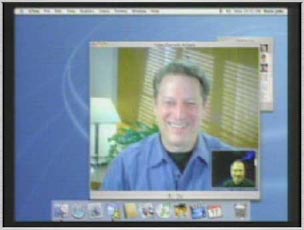
Steve iChats with Al Gore
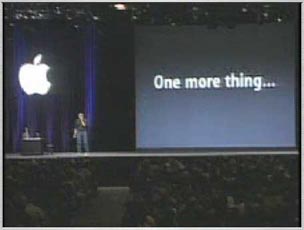
The patented "One more thing..."
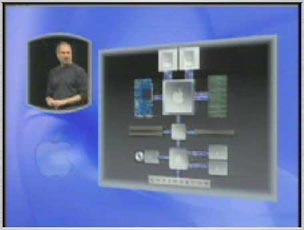
All new G5 system architecture

PowerMac G5
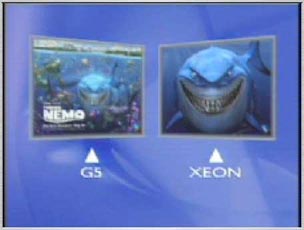
The Photoshop face off: G5 vs. Xeon
|
Here's my summary:
Updates:
- Apple Stores - 48 opened, 15M visitors
- iPods - 1M sold (!)
- Apple Music Store - 5M songs in 8 weeks
New Mac OSX 10.4 aka "Panther"
- Now #1 Unix worldwide
- Safari 1.0 released
- New Finder! (Nice looking GUI)
- iDisk syncs automatically to .mac
- New Mail!
- Pixlet - new "studio quality" QT codec
- Fast user switching
- FontBook - app for managing fonts
- developer release available now
- $129 - by year-end
iChat audio / video conferencing
- "Video conferencing for the rest of us"
- integrates with AIM, .mac, and Rendezvous
- iSight camera / microphone - $149
Xcode - new development environment
- 5X faster
- GCC 3.3 compiler
- distributed builds
- incremental links, precompiler, "fix and continue"
- new GUI - looks Visual-Studio-like
PowerMac G5!
- 64-bit CPU from IBM
- up to 2 x 2GHz (SMP)
- 1GHz frontside bus
- Apple custom ASIC for bus management
- up to 8GB of 400MHz 128-bit DDR RAM
- AGP 8X graphics
- up to 500GB serial ATA disk drives
- firewire 400 / 800
- USB 2.0
- GB ethernet
- airport 802.11g
- bluetooth
- optical digital audio
- available in August
There were two highlights in my opinion. First and foremost, Apple is no longer dependent upon Motorola to remain competitive with Intel; they now have IBM in their camp. Second, the new development environment is going to make it easier for people to port stuff from Windows. Developers are the key to a successful platform, and Apple seems to be realizing this. It is no coincidence that these announcements were made at their developer's conference, not MacWorld.
Overall it was a very impressive performance, with some great new products. A new OS, a new development environment, a new hardware platform, and a cool video conferencing app thrown in for good measure.
|
|
L.T.Smash has a great summary of current events: It's not over yet.
A good sign: the Baghdad Bulletin begins publishing. "The Baghdad Bulletin is Iraq's only English-language newsmagazine and one of the country's only independent publications." [ via Jeff Jarvis, who is contributing an article about how to start a weblog... ]
The Supreme Court rules on the University of Michigan case: Narrow use of affirmative action preserved in college admissions. Sigh. This is absolutely racist - how can discrimination based on race be defended?
From the majority opinion: "The Constitution does not prohibit the law school's narrowly tailored use of race in admissions decisions to further a compelling interest in obtaining the educational benefits that flow from a diverse student body."
In other words, you may be racist as long as your intentions are good?
[ Later: Philip Greenspun agrees. And he claims affirmative action teaches people to be prejudiced. So - may you be racist with good intentions if it doesn't work? ]
Razib discusses prejudice. "Different forms of prejudice are held to different levels of disrepute. Race is the most heinous one. Sexism is the most acceptable. And others like religious bigotry fall somewhere in the middle." Interesting that so many people confuse race, a genetic characteristic, with religion, a belief system (e.g. "Jewish").
 The WP notes Love for the Bug Runs Out. "The iconic Volkswagen Beetle, the most popular car ever made, will cease production this summer, 69 years and more than 21 million sales after Adolf Hitler's Third Reich first commissioned the durable, dome-shaped little 'People's Car.'" So long, Herbie! [ via Tim Blair ] The WP notes Love for the Bug Runs Out. "The iconic Volkswagen Beetle, the most popular car ever made, will cease production this summer, 69 years and more than 21 million sales after Adolf Hitler's Third Reich first commissioned the durable, dome-shaped little 'People's Car.'" So long, Herbie! [ via Tim Blair ]
This is too cool - lawmakers in Bellevue, Washington, are considering auctioning stickers which enable single drivers to use diamond lanes. What a great use of markets.
I'm still recovering from watching the Apple WWDC conference. I'm scheming to get a G5. Surely Aperio needs to port our image processing tools!
The Polynesian Island of Niue, owner of the .nu TLD, has completed an island-wide WiFi network. They are the first nation with full WiFi coverage. I am not making this up - and I want to go there!
|
|
You want yet another example of how dumb patents are? Netflix granted patent on DVD rental service. C'mon. Are you telling me this is sufficiently innovative that they should have a monopoly for 17 years?
Tom Yager pokes holes in Apple's G5 SPEC benchmarks. "The Power Mac G5 shows major ass-kicking potential. Apple's got too much class to resort to sketchy benchmarks."
[ Later: Slashdot posts a rebuttal from Apple, recounted from a 'phone interview. ]
Adam Curry comments favorably on iChat AV. He points out that you can't see video unless you have a camera attached. There is no technical reason why this should be, so there must be a market reason, and I believe he nailed it; Apple didn't want iChat AV to become a p0rn tool... (Of course, it will anyway, how long do you think it will take for someone to hack this? :)
The Detroit News: Beyond Kazaa, a Grand Plan. "Nikki Henning [CEO of Kazaa] to the entertainment industry: 'Realize that this technology is inexorable, and come to the table'." Yeah, right, like that's going to happen. But she is right, isn't she?
This is great - check out nationmaster.com, which let's you compare different nations in a huge variety of ways. Want to know the youngest nation? Uganda (high birth rate, high death rate). Poorest? Zambia. Most generous? Luxembourg. What a treasure trove! And it is freely available on the Internet, the greatest tool man has ever devised. (I'll defend that in 100 years after it becomes obvious.)
 Are you ready for some biking? The Tour de France is coming up, July 5-27. Trek has a great site with Tour info, which is terrific because in years past nobody did (the "official" Tour site is French and sucky). This should be an interesting year with American Lance Armstrong the favorite to win his 5th Tour in a row, which will probably not sit well with the French populace. 3,400 kilometers spread over 23 days, including some of the toughest mountain climbs in the world. If you can finish this race, you're an athlete. If you can win it five years in a row after surviving testicular cancer, you're amazing :) Are you ready for some biking? The Tour de France is coming up, July 5-27. Trek has a great site with Tour info, which is terrific because in years past nobody did (the "official" Tour site is French and sucky). This should be an interesting year with American Lance Armstrong the favorite to win his 5th Tour in a row, which will probably not sit well with the French populace. 3,400 kilometers spread over 23 days, including some of the toughest mountain climbs in the world. If you can finish this race, you're an athlete. If you can win it five years in a row after surviving testicular cancer, you're amazing :)
Mostly a note to myself so I can find it later: Don Park illustrates "funkyness" in RSS feeds. My feed is funky even though it doesn't use any Dublin Core elements, but it seems to work with all aggregators. Perhaps it is my content which is funky!
{If you use an RSS aggregator and my feed doesn't work, please tell me!}
I've been getting a whole passel of spams advertising anti-spam tools. Fascinating. Kind of like pop-up ads which advertise anti-pop-up tools. A distant cousin of the famous robot which turned itself off. Good thing I have Matador (to filter spam) and Mozilla (to eliminate pop-ups)...
 The secret behind Google's success: Pigeon Rank. I am not making this up. But they are... The secret behind Google's success: Pigeon Rank. I am not making this up. But they are...
The last couple of days I've had a ton of traffic. And unlike every other time this has happened, it isn't because of one new article. Somehow there are just more people coming by... Thanks, and I hope you found it worthwhile!
|
|
 Reuters is carrying an unconfirmed report that former Iraqi information minister Mohammed Saeed al-Sahaf, aka "Baghdad Bob" has been captured. "'He has some serious talking to do...this time', a 'senior coalition source' was quoted as saying." Verrry interesting... Reuters is carrying an unconfirmed report that former Iraqi information minister Mohammed Saeed al-Sahaf, aka "Baghdad Bob" has been captured. "'He has some serious talking to do...this time', a 'senior coalition source' was quoted as saying." Verrry interesting...
Bill Gates sent an email update to Microsoft partners and customers today, calling for government and corporate cooperation to fight junk mail. "Spam is so significant a problem that it threatens to undo much of the good that e-mail has achieved." In a case of supreme irony, my spam filter treated Bill's email as spam.
Jim Lynch gives Lindows 4.0 "the Mom Test". It passed. Perhaps Linux really will make inroads on the desktop... the machines sure are cheap inexpensive .
Tim Bray thinks intelligent search is a Turing Test. He's probably right; Google doesn't search anything like the way an experienced librarian does, any more than Deep Junior plays chess like Garry Kasparov... in fact this analogy is apt because in both cases the computer substitutes being able to do something simple very fast for being able to do something complicated.
|
|
Rats. I love my Sharp DVD recorder, but I knew it was early in the curve. Now Pioneer has announced DVD recorders which include Tivo. Of course the 120GB model will cost $1,800. "At these prices, they aren't making a play for the mass market." But of course prices will come down...
Wired has a great interview with Robert Moog, inventor of the first commercial music synthesizer. "A hundred years ago, music was a social thing - musicians would face one another and bond through sound. Now, everybody is by himself." He is apparently building the "Minimoog", a new small music synthesizer with the Moog sound. Oh yeah, and it will be built from analog hardware.
Design according to Ive: a tour of the new Apple G5 courtesy of Jonathan Ive, Apple's lead industrial designer. In how many computer companies is the lead industrial designer better known than the chief technologist?
It's a thing: Nanotech Spending Nears $3 billion.
Lockergnome has RSS feeds for Amazon products! How cool is that!
 This week's Carnival is presented by A Single Guy in the South, complete with a "backroadin' Southern song" for each blog. My favorite new song, er, blog is "I Know This is Probably Bad for Me", which sounds like a Southern song but is actually a blog. Y'all check 'em out, hear? This week's Carnival is presented by A Single Guy in the South, complete with a "backroadin' Southern song" for each blog. My favorite new song, er, blog is "I Know This is Probably Bad for Me", which sounds like a Southern song but is actually a blog. Y'all check 'em out, hear?
Something only for web nerds... The RSS wars continue. Mark Pilgrim asks "will the real RSS validator please stand up?" (My WN is 1/2, by the way.) Steve Gilmor considers RSS also, among other things, in a well written article.
Google likes me! I've concluded that there must have been a change to Google's ranking algorithms. This week I've been getting a lot more traffic, and after poking around I've discovered you guys have mostly been sent from Google. And you're going all over my site to all sorts of old posts. For some reason Google must be putting my site higher up in their ranking of search results. Must be because I'm feeding their pigeons :) Anyway, if you're here because Google sent you, thanks for coming!
|
|
Aperio has a partnership with a company called Zoomify, which makes web-based image viewing tools. We recently collaborated on a Flash viewer for virtual slides. Zoomify provides the front-end client, and Aperio provides the back-end server (as well as having digitized the slides with our ScanScope scanner). The results are amazing.
Below are some actual virtual slides; click on any of the thumbnails to launch the viewer. Now you, too, can be a web-based Pathologist!
 |
 |
 |
|
Alzheimer's
69722 x 61038 @ 40X |
Breast Cancer
73091 x 62821 @ 40X |
Hodgkin's
61922 x 63771 @ 40X |
 |
|
|
 |
 |
 |
|
Nerve Sheat Myxoma
58984 x 35659 @ 20X |
Trichrome Stain
18118 x 27754 @ 20X |
Leiomyoma
38757 x 32978 @ 40X |
Note that several of these images are larger than 10GB! Okay, I know I'm bragging a little, please forgive me. I just thought it was cool :)
|
|
 Sabine Herold is pretty cool. She is a political science student, beautiful, and speaks perfect English. She has also just become the most famous 21-year-old in France. She's even been called Joan of Arc. "That is stupid," she says. "I love Britain. I love Margaret Thatcher. I love the way you have overcome the unions and are not afraid to privatize. I love the way you work so hard. In France, we have become lazy and staid. We think only of weekends, holidays and how great we once were." Maybe there is hope for France, yet. Sabine Herold is pretty cool. She is a political science student, beautiful, and speaks perfect English. She has also just become the most famous 21-year-old in France. She's even been called Joan of Arc. "That is stupid," she says. "I love Britain. I love Margaret Thatcher. I love the way you have overcome the unions and are not afraid to privatize. I love the way you work so hard. In France, we have become lazy and staid. We think only of weekends, holidays and how great we once were." Maybe there is hope for France, yet.
Salon has an interesting review of Legally Blond 2. "We can find the next generation of leaders by just looking in the mirror. " I knew it was funny, but I didn't realize it had a message. Almost like Reese Witherspoon plays, well, Sabine Herold...
Chris Pirillo goes on an "anti-tablet attack", and Robert Scoble responds... Chris is saying tablets are not as good as laptops, and not as good as PDAs. Roberts points out they aren't supposed to replace laptops or PDAs, they serve new markets which weren't served by anything before. They're both right, which explains why I don't want one (I have a laptop and a PDA :) and why a lot of other people do...
Google has a new program called AdSense, which allows anyone to serve Google ads on their pages. Essentially Google analyzes your page and determines which "text" ads would be most appropriate for your viewers. You simply pop some JavaScript into your pages, and poof you're done. Google pays you for each click-through!
Aaron Swartz has a little tool which shows you which ads Google would display on any page. Pretty cool. I messed around with it, but don't worry; I have no plans to host ads :) 
In other Google news, they are beta-testing a new version of their toolbar. It features a pop-up blocker (!) and an auto-fill facility (!!) as well as a "blog this" button for Blogger (!!!) The Blogger button is proprietary, by the way, it does not use the Blogger API. (Boo.) Very cool.
This Echo / RSS thing is heating up. Tim Jarrett weighs in on the side of common sense. Dave Winer says he doesn't control RSS, gives a tentative endorsement of Echo, and tries to explain. For more see Sam Ruby and Mark Pilgirm. That's enough of that; I'm going to leave it alone until it is real. Web plumbing is a lot less interesting than web content, anyway.
|
|
 When I was 17 I bought an HP-25 calculator, billed as "the minimum computer". (Check out this HP-25 review from Creative Computing, circa 1977.) I remember distinctly it cost $350 in 1976 dollars. At the time it was the single largest purchase I had ever made. I loved that little machine, and spend hours composing programs for it. Quite amazing what it was able to do with essentially little more than a programmable calculator's instruction set. And of course no external store - every program had to be hand-entered each time. Its ability to do really big floating point numbers was amazing for its day... (Chemistry students do *lots* of floating point calculations.) I still have it - and it still works! When I was 17 I bought an HP-25 calculator, billed as "the minimum computer". (Check out this HP-25 review from Creative Computing, circa 1977.) I remember distinctly it cost $350 in 1976 dollars. At the time it was the single largest purchase I had ever made. I loved that little machine, and spend hours composing programs for it. Quite amazing what it was able to do with essentially little more than a programmable calculator's instruction set. And of course no external store - every program had to be hand-entered each time. Its ability to do really big floating point numbers was amazing for its day... (Chemistry students do *lots* of floating point calculations.) I still have it - and it still works!
If you have never used an HP-25 - and especially if you have! - please check out Larry Leinweber's fantastic Java HP-25 emulator; go to this page, and scroll down until you see the R/S button, then click on it.
Back in 1977 the big computing wars were between Hewlett-Packard and Texas Instruments. Each side had vociferous supports, and drew derision from the other. HP was famous for using RPN, aka Reverse Polish Notation, which is essentially stack-based math. The TI used a more conventional algorithmic notation, including support for punctuation like parenthesis. RPN was cool because it saved keystrokes and made programming easier, and also because it was so different; the average person couldn't even pick up an HP calculator and add two numbers together. (You enter the first number, push the ENTER key, then enter the second number, then push PLUS. There is no EQUALS in RPN.)
 I was reflecting on this little guy recently when using my Handspring Treo's calculator, which oh-by-the-way does hexadecimal arithmetic. (In addition to being a 'phone, and an address book, and a calendar, and an email client, and a web browser.) Amazing the progress which has been made in 25 years... Programming the HP-25 to perform hex arithmetic was highly non-trivial, but I did it; in those days most programming was done in assembler, and 16-bit machines used hex. Just to completely date myself; I *still* know most of the ASCII to EBCDIC conversion table by heart. I was reflecting on this little guy recently when using my Handspring Treo's calculator, which oh-by-the-way does hexadecimal arithmetic. (In addition to being a 'phone, and an address book, and a calendar, and an email client, and a web browser.) Amazing the progress which has been made in 25 years... Programming the HP-25 to perform hex arithmetic was highly non-trivial, but I did it; in those days most programming was done in assembler, and 16-bit machines used hex. Just to completely date myself; I *still* know most of the ASCII to EBCDIC conversion table by heart.
(Later I got an HP-16 which was the ultimate godsend for hex assembler programmers; yeah, I still have it, and yeah, it still works, too.)
If you look around, you'd have to conclude that the pace of technological progress is not slacking; to the contrary, new stuff is popping up all over the place. So if this is the progress made in the last 25 years, what will the next 25 years bring? Hard to imagine any qualitative improvement over a Treo, but probably in five years we'll read this page and laugh!
|
|
David Burbridge posted an interesting note on GNXP about birth rates. The key point is that women's average fertility is only one factor in the growth of populations. (This reminds me that someday I have to get going on Unnatural Selection again...)
 I've been hearing a lot of positive buzz about Altered Carbon, a debut science fiction novel by Richard Morgan. I'm going to taste it, stay tuned... I've been hearing a lot of positive buzz about Altered Carbon, a debut science fiction novel by Richard Morgan. I'm going to taste it, stay tuned...
The NYTimes reviews iChat AV, Apple's new video conferencing software. "In iChat AV, video is as crisp, clear, bright and smooth as television." Man, I'm going to have to try this. I experimented with video conferencing using Microsoft NetMeeting about three years ago, and it was a total failure. But it seems like Apple has a winner.
 And here's something cool - the world's smallest printer. You just wave this handheld device around over a piece of paper, and it prints. Much like a mouse, it figures out by your movement where it is, and prints accordingly. Very cool! {I remember when handheld scanners first came out; it seemed like they wouldn't work, but they did...} And here's something cool - the world's smallest printer. You just wave this handheld device around over a piece of paper, and it prints. Much like a mouse, it figures out by your movement where it is, and prints accordingly. Very cool! {I remember when handheld scanners first came out; it seemed like they wouldn't work, but they did...}
Scoble's not going to join the national "do not call" registry. So be it. I did.
I said I was going to leave Echo alone, and I mean to, but Jon Udell posted a must read: Mr conversation with Mr. Safe. As usual Jon is the man in the middle, considering both sides and shedding light.
Mr. Safe himself [Tim Bray] comments: Stamp out creativity now.
By the way, here's the Echo Wiki itself. ("Pie" was an early maybe-name, as in "easy as pie".)
BusinessWeek considers the implications of Tivo's monitoring of your surfing habits: A horror show for TV ads. (As you read this keep in mind that Tivo only reports aggregate behavior, nothing you do is directly monitored.)
|
|
Of all the women who have ever lived, there was one woman who was special. She was the common maternal ancestor of all women currently alive. She was "Mitochondrial Eve".
Consider the set of all women who have ever lived. Each had exactly one mother. Now shrink the set of all women to contain only mothers. Each of them had exactly one mother. Shrink the set again to contain only mothers of mothers. Again, each of these women had exactly one mother. Again, shrink the set to contain only mothers of mothers of mothers. Continue doing this until you have a set with exactly one woman. She is the maternal ancestor of all living women; she is Mitochondrial Eve.
We don't know much about ME. We do know that she had at least two daughters. If she didn't have any daughters she couldn't be ME, and if she had only one daughter then her daughter would be ME.
 The reason this woman is called Mitochondrial Eve is interesting and significant. Inside all living cells are structures called Mitochondria, which function as the "power sources" for the cell. Evolutionary biologists believe that mitochondria were originally separate organisms similar to bacteria, which were "captured" by cells long ago. Mitochondria have their own DNA, separate from the cells DNA. All animals inherit their mitochondria and their mitochondrial DNA solely from their mother. So Mitochondrial Eve is the sole ancestor to a long line of successful mitochondria, and her mitochondrial DNA (mtDNA) is found in all living humans. The reason this woman is called Mitochondrial Eve is interesting and significant. Inside all living cells are structures called Mitochondria, which function as the "power sources" for the cell. Evolutionary biologists believe that mitochondria were originally separate organisms similar to bacteria, which were "captured" by cells long ago. Mitochondria have their own DNA, separate from the cells DNA. All animals inherit their mitochondria and their mitochondrial DNA solely from their mother. So Mitochondrial Eve is the sole ancestor to a long line of successful mitochondria, and her mitochondrial DNA (mtDNA) is found in all living humans.
Interestingly, geneticists believe that ME lived as recently as 200,000 years ago, based on the observed variation in mitochondrial DNA found in present-day humans.
When ME was alive, she was almost certainly not "the ME". There would have been other women alive at the same time who would have had different female ancestors. It is only retrospectively, as a function of the women alive today, that ME is "the ME". Furthermore, in the future she may again no longer be "the ME"; the entire female line of one of her daughters may die off, leaving one of her daughters or granddaughters or great-granddaughters or ... with the title.
I find it fascinating that it is logically provable that ME existed. You may too, or you may be thinking "so what?" But aside from being an interesting concept, akin to "the tallest living man", what else about ME is interesting? Well, the fact that mtDNA is inherited solely from one parent makes it a simple and interesting way to track variations in human populations. It is both easier and more accurate than measuring variations in cell DNA. Assuming that mtDNA mutates with a relatively consistent rate, and given that all living humans had one common mtDNA ancestor (ME), then measuring the average difference between mtDNA samples taken from human populations is a good way to measure the "evolutionary distance" between them.
mtDNA does not necessarily mutate with the same frequency as cell DNA, in fact, most human geneticists feel it probably mutates far less frequently, both because it is genetically "old", and because it only reproduces by fission, leaving less opportunity for "crossing over". mtDNA therefore provides an interesting "fixed timeline" for comparing potential mutations and mutation rates in cell DNA.
I should mention that some have argued that mtDNA need not mutate with a relatively consistent rate, due to technical reasons involving the mechanisms of mitochondria formation within cells. If it doesn't it would make mtDNA variation less useful in genetic studies, but it would not mean there was no ME, contrary to arguments others have advanced.
Mitochondria are essential structures in cells, providing as they do the chemical machinery for generating energy. We can surmise that at one time there was tremendous selective pressure on mtDNA, leading to the present high peak in the valley of fitness. Because all living humans have a recent common ancestor, they all have similar mtDNA and similar mitochondrial function, and hence there is little selective pressure. There is evidence to suggest differences in mitochondria may result in differences in human aging. This would be an important finding if true, leading to much fruitful research, but would not affect selection in the slightest; what is important in selection is how many children you have and when you have them, not how long you live after you have them...
Other than satisfying the definition given above, what was special about ME? Well - nothing! She was in all likelihood an unremarkable woman, not especially different from her contemporaries in any significant way. Her coronation as ME owes as much to luck as to genetic fitness or any other factor. But just think how much the course of history would have changed had some accident befallen her! This is the butterfly effect in evolution :)
{By a similar argument, there was one man who was Y-chromosome Adam, the common male ancestor of all men who are alive today... It is astronomically unlikely that ME and YA were contemporaries, and even more unlikely that they knew each other or mated together.}
[ This post owes much to Daniel Dennett's classic book, Darwin's Dangerous Idea. ]
[ Later: this post attracted a bunch of interest - thank you! - and several people asked a key question: what species was ME? ]
|
|
Sci-Fi Hi-Fi: Apple DRM Revisited. Or how the Apple Music Store protects the music they sell so it isn't easily pirated...
The Electronic Frontier Foundation responds to the RIAA's plans to sue individual users for file sharing: "It's plain that the dinosaurs of the recording industry have completely lost touch with reality." Yep.
 Slate: Harry Potter and the International Order of Copyright. How long do you think it will be before we'll all be able to print our own books? Then digital rights management will be necessary for books, too... Right now it is just intellectual property, because the barriers to duplication are a bit high. Slate: Harry Potter and the International Order of Copyright. How long do you think it will be before we'll all be able to print our own books? Then digital rights management will be necessary for books, too... Right now it is just intellectual property, because the barriers to duplication are a bit high.
And speaking of digital information media (we were, right - music and books...), InfoTrends predicts that digital photography will completely replace film by 2008. [ via Ottmar Liebert, who seems to blog about many of the same things I find interesting! ]
So when do you think digital video will replace analog film in movie theaters? Within ten years, I would guess. And that will have its own set of DRM issues!
Boy I said I would leave Echo alone, but it won't leave me; Scoble has a long rant about Dave Winer and the goodness of RSS. I sure hope there's more to RSS than separating RSS from Dave!
We have the NYTimes and Microsoft and CNet and now we even have Oracle supporting RSS, why do we have to go change it? Why can't it be evolved? Just because of some API problems? Sheesh.
Brian Keller says "Whidbey is going to rock". Whidbey is the code name for the next version of Visual Studio, for which Brian is the program manager. That's great - I use VS every day, so this will really matter to me, but... This is the bad thing about all these developers having blogs; they tease you by telling you how cool everything is, but their companies won't let them tell you why. I say either tell us why Whidbey or Longhorn or whatever is going to rock, or don't say anything.
Psst! Want to be an A-list blogger? Then the Internet Pundit Fantasy Camp is for you. Satire is best when it runs close to truth, eh? (Or is this really truth?)
|
|
My post about Mitochondrial Eve attracted a bunch of interest - thank you! - and several people asked a key question: what species was ME?
There is no direct evidence about ME at all - we have not found a fossil record of this particular individual. We can infer logically that she must have existed, and we can deduce approximately how long ago she lived from the amount of variation in Mitochondrial DNA (mtDNA) among present humans - about 200,000 years ago. This analysis also indicates the probable region in which she lived - East Africa.
From the age and region, we can deduce the species, see the following timeline:
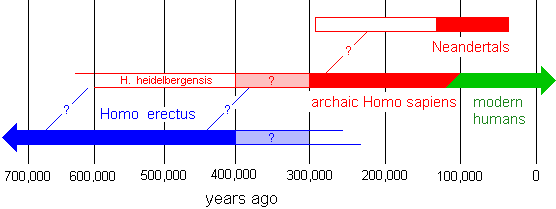
As you can see, homo heidelbergensis was the direct ancestor species for homo sapiens. This species has been further divided into homo sapiens archaic and home sapiens modern; a distinction made based on recent fossil finds. The earliest human skulls were recently found in Ethiopia, dated about 160,000 years ago. ME was most likely homo sapiens archaic, although based on this date and region, it is possible she was an early homo sapiens modern. [ thanks to Dennis O'Neil for the diagram ]
One fascinating point to make in this connection is that there is never a "first organism" for any species. Much like ME itself, the crown of "earliest organism" for a species is retrospective, since speciation takes place over thousands of years and can only be discerned gradually. The classic definition of species - organisms which can interbreed - is not as cut and dried as one would like; there are often cases where A can breed with B, and B can breed with C, but A cannot breed with C.
It is interesting to speculate on the early history of ME and her ancestors. Was there a catastrophic event which eliminated many of ME's competitors, funneling the genetic ancestry through a single line? Perhaps ME migrated into a region which was spared from a climatic or other environmental event. Or perhaps ME embodied a mutation which conferred immunity from a particular disease. ME's daughters and granddaughters might have followed a single evolutionary path, living together in the same region and contributing to a common gene pool. Or perhaps one or more daughters split off, forming subspecies which ultimately died out.
The transition period from H. sapiens archaic to H. sapiens modern is about 50,000 years, or about 250,000 human generations. Although that seems like a lot, this is actually a short timescale from an evolutionary standpoint. The genetic changes over this period would be slight.
It is suggestive that ME apparently lived right at the earliest time where the fossil record indicates the transition from H. sapiens archaic to H. sapiens modern. The family tree for ME must have contained thousands of branches which did not successfully make it to the present day, although we know from the very definition of ME that it does contain at least two which did!
|
|
I sent the following email today, after seeing this homepage on Scripting News...
To: Dave Winer (dave@userland.com)
Subject: You're ImportantDave -
I think I understand how you feel. For years you persevered with RSS, fighting Microsoft alongside Netscape, and now that it is finally getting traction and being used widely, this Echo thing has come along. I honestly don't understand why RSS has to be fixed - it doesn't seem broken to me - but what must be especially frustrating for you is that the reason seems to be that people don't like working with you, not because of some technical reason. If RSS 2.0 needs extensions or the spec needs tightening up, fine, invent 2.1 and tighten up the spec. If the metaWebLog API needs additional features or the spec needs tightening up, fine, extend the API and tighten up the spec. But don't turn it into a personal attack.
I think you're really important. I sometimes joke about you - I've been known to say my WN is 1/2 - but I don't mean anything by it really; like a lot of people I have respect for you and respect for the things you've built. You have also kept the big picture - that it is important for small developers and users to unite on RSS otherwise some BigCo will have the opportunity to dictate.
Anyway, please hang in there. Hopefully this Echo thing will pass, but even if it doesn't it will owe all its concepts and underpinnings to RSS.
Ole
|
|
I talked to my Mom today. She said my 'blog is getting boring, too much technical stuff and not enough politics. Of course when I write about politics people tell me they don't care about that, they read for the technical stuff. I guess I'll just have to write whatever I want, that's easiest anyway :)
So, I see where Fatah, Hamas, and Islamic Jihad have jointly declared a ceasefire . I can't help but be cynical about this; they have a long list of demands from Israel. As soon as it becomes obvious that the demands are not going to be met - and there is no political way they will be - it will give the terrorists an excuse to go back to violence.
I think President Bush has the right idea: U.S. Cautious about Palestinian Truce. "The White House on Sunday called a three-month suspension of attacks by Palestinian militant groups a step in the right direction but said the Palestinian Authority must still dismantle 'terrorist infrastructures.'" Yep.
Steven Den Beste is running a betting pool: how long till the next suicide bombing? He thinks less than four days...
What happens when a government systematically denies the truth? In a medical situation with extreme implications for the populace? South Africans rape children as the cure for AIDS . Apparently people believe that having sex with virgins will cure AIDS, mostly because they lack for real medical information. Unbelievable.
 I just got the latest issue of Fortune magazine. Not good. On the cover: Krispy Kreme is "America's hottest brand"; inside you can find The Hole Story. Well I read it and I must say it shed no light whatsoever, even though the story is full of holes (sorry). This could have been an interesting story about what makes a successful consumer brand, and how such a thing as a donut "tips", but no... Also inside, a story about "the 50 best companies for minorities". There are accompanying articles on "diversity", with the theme echoed by a lot of ads. I just got the latest issue of Fortune magazine. Not good. On the cover: Krispy Kreme is "America's hottest brand"; inside you can find The Hole Story. Well I read it and I must say it shed no light whatsoever, even though the story is full of holes (sorry). This could have been an interesting story about what makes a successful consumer brand, and how such a thing as a donut "tips", but no... Also inside, a story about "the 50 best companies for minorities". There are accompanying articles on "diversity", with the theme echoed by a lot of ads.
C'mon, people, this is 2003. Focusing on race is so 1900s. Any differential treatment based on skin color is discrimination! Do we run articles about "the 50 best companies for blondes"? How about "the 50 best companies for short people"? Or even "the 50 best companies for Italians"? Perhaps because I've been a technologist in an industry like software which is highly integrated, but it seems people really don't pay attention to race any more. I've worked with people from all over the world and from every race, and it just doesn't matter. Companies hire and promote the best possible people for a position regardless of race because they must to be competitive. I think articles like this one are a step backward; Fortune needs to wake up.
The NYTimes considers the implications of the success of Harry Potter and the bootlegged Hulk movie: Harry crushes the Hulk. The point seems to be that kids like Harry Potter so they bought the new book, whereas they don't like the Hulk so they "pirated" it by downloading the bootleg. Huh? This is totally incorrect. People paid for the book because they couldn't get the content any other way. Imagine an e-book environment where reading was pleasurable (a really thin flexible tablet, or something like that), and imagine e-books were available on Kazaa (as they surely will be, someday); does anyone seriously doubt many many people and not just kids would have downloaded Harry? The big difference - indeed the only meaningful difference - between books and movies at this point in time is the technology. And that will change.
Tim Bray continues his series on search technology: Squirmy Words. Yeah, "squirmy" is a technical term :)
A lot of reaction to Dave's taking down Scripting News for a day... see The Scobleizer for links.
Don Park: My Take on Echo's Future. "I don't think the chance of Echo replacing RSS is very good." Don was an early supporter of Echo.
Dave Winer: Okay I think I've made my point.
Hey, Dr. GUI has a blog! Warning this is for geeks only. Dr. GUI is a mythical character from Microsoft's Developer Network newsletters; he basically does Q&A on highly technical issues posed by developers. (GUI is an acronym for Graphical User Interface.) One thing for sure, the good doctor is always "in".
Intellitoast. Pretty cool for being a hot use of Flash :)
|
|
Hey, it's my six month blogiversary! I've now been blogging for 187 days, during which time I've made 233 posts, and written 33 articles. We've served 44,251 visitors, of whom 5,106 have come back at least three times. Amazing, this is really cool. Thank you all for coming by...
The official capacity of Dodger Stadium is 56,000, but most games the attendence is pretty close to 44,000, so that's an easy number for me to visualize. That is a lot of people. Blogging is so excellent, how else could I possibly communicate with that many people!
 This is cool - an "inkjet printer" for walls, made from a can of spray paint. When you click through, be sure to check out the movie of the printer in action. [ via Boing Boing ] This is cool - an "inkjet printer" for walls, made from a can of spray paint. When you click through, be sure to check out the movie of the printer in action. [ via Boing Boing ]
 You know how people always say Microsoft never gets it right the first time, but they always get it right eventually? Here's further evidence: BW describes Microsoft's Second Assault on Smartphones. I guess when you have $46B in the bank you can afford to try more than once. You have to give them credit, they see a big market, they want it, and they don't give up until they get it. You know how people always say Microsoft never gets it right the first time, but they always get it right eventually? Here's further evidence: BW describes Microsoft's Second Assault on Smartphones. I guess when you have $46B in the bank you can afford to try more than once. You have to give them credit, they see a big market, they want it, and they don't give up until they get it.
Netscape 7.1 released. Yawn.
Mozilla 1.4 released. Yawn.
Astrobiology has posted NASA's timeline of the top 75 events in planetary exploration. You can see from the dates that we had a good head of steam for a while, but the last decade nothing much has happened. A short-sighted reallocation of resources, in my humble opinion. My father was in charge of software simulation at JPL for the Pioneer missions...
P.S. How cool is it that there is such a thing as Astrobiology Magazine?
Adam Curry reports that whenever he is asked for an interview by a Dutch magazine, he insists that an audio transcript be available to post on his weblog! (Adam is an ex-MTV VJ now living in Amsterdam.)
Gary Wolf: Louis Rossetto vs. Dave Winer. The founder of Wired took on the scion of weblogs back in 1994.
Are you a coder, or a coder manager (aka "cat herder")? Do you and/or your team use dual monitors? If you don't, please check out this JoelOnSoftware thread. Every seems to agree it helps - I'm going to try it with my team. I have a dual monitor setup myself - I use my laptop and my external monitor as separate windows to my desktop - and it is great for debugging GUIs.
Marc Cantor: The Go Game. I don't get it, but it looks fun anyway.
|
Return to the archive.
|


|




